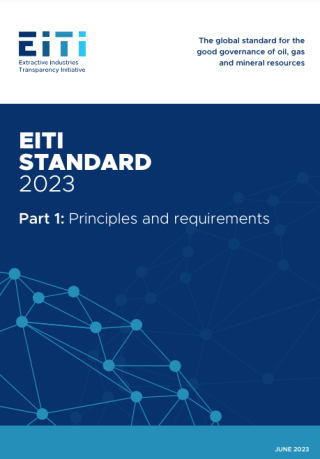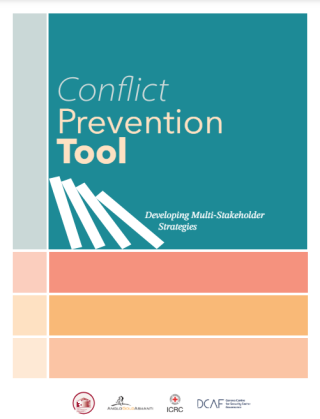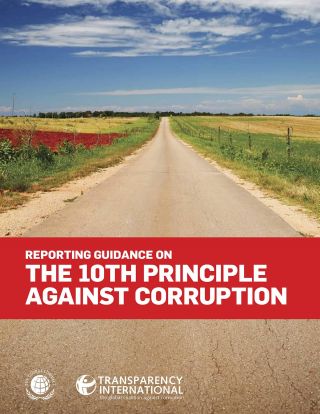Global
186 articles:
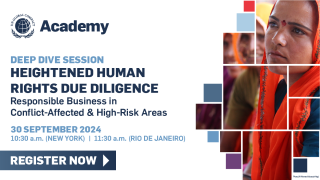
Video Available! UN Global Compact Webinar on Heightened Human Rights Due Diligence: Responsible Business in Conflict-Affected and High-Risk Areas (CAHRAs)
UN Global Compact Academy Human Rights Series

How can companies address security concerns as part of their Environmental, Social and Governance (ESG) obligations?
ESG Global Leaders Conference
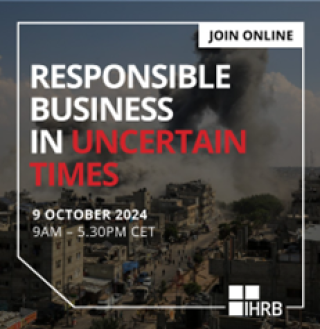
Upcoming Event: Responsible Business in Uncertain Times: Strengthening Corporate Leadership Amidst Widening Global Conflicts
IRHB Event
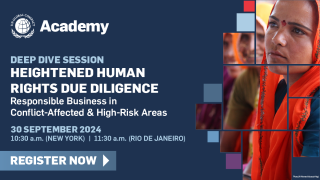
Heightened Human Rights Due Diligence: Responsible Business in Conflict-Affected and High-Risk Areas
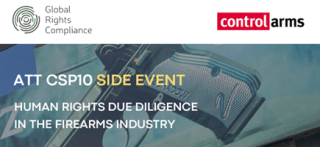
Arms Trade Treaty: DCAF Shares Learnings from Human Rights Due Diligence in other Sectors at Side Event
Side event

DCAF Participates in the General Assembly of the UN Global Compact Network Switzerland and Liechtenstein
DCAF Participates in GA of UNGC Network
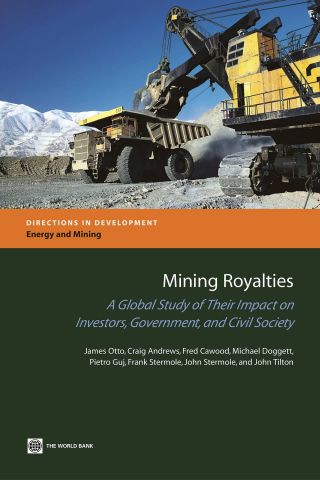
Mining Royalties: A Global Study of their Impact on Investors, Government, and Civil Society (The World Bank, 2006)
Mining Royalties: A Global Study of their Impact on Investors, Government, and Civil Society (The World Bank, 2006)

Child Rights and Security Handbook: An implementation companion to the Child Rights and Security Checklist (UNICEF, 2018)
Child Rights and Security Handbook: An implementation companion to the Child Rights and Security Checklist (UNICEF, 2018)

Responsibly undertaking resettlement activities is one means by which companies can positively contribute to development

Site-level Grievance and Community Response Mechanisms: A Practical Design and Implementation Guide for the Resource Development Industry (MAC, 2015)
Site-level Grievance and Community Response Mechanisms: A Practical Design and Implementation Guide for the Resource Development Industry (MAC, 2015)

A Business Reference Guide: United Nations Declaration on the Rights of Indigenous Peoples (UN Global Compact, 2013)
A Business Reference Guide: United Nations Declaration on the Rights of Indigenous Peoples (UN Global Compact, 2013)

FPIC and the Extractive Industries: A Guide to Applying the Spirit of Free, Prior and Informed Consent in Industrial Projects (IIED, 2013)
FPIC and the Extractive Industries: A Guide to Applying the Spirit of Free, Prior and Informed Consent in Industrial Projects (IIED, 2013)
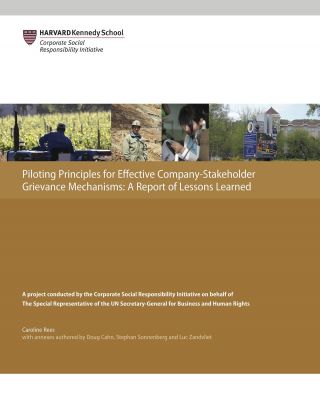
Piloting Principles for Effective Company-Stakeholder Grievance Mechanisms: A Report of Lessons Learned (Rees, 2011)
Piloting Principles for Effective Company-Stakeholder Grievance Mechanisms: A Report of Lessons Learned (Rees, 2011)

Good Practice Note: Addressing Grievances from Project-Affected Communities (IFC, 2009)
Good Practice Note: Addressing Grievances from Project-Affected Communities (IFC, 2009)

Mapping Grievance Mechanisms in the Business and Human Rights Arena (CSR Initiative, 2008)
Mapping Grievance Mechanisms in the Business and Human Rights Arena (CSR Initiative, 2008)

Rights-Compatible Grievance Mechanisms: A Guidance Tool for Companies and Their Stakeholders (CSR Initiative, 2008)
Rights-Compatible Grievance Mechanisms: A Guidance Tool for Companies and Their Stakeholders (CSR Initiative, 2008)

Resource/Extractive Companies and Indigenous Peoples Engagement: Recipe for Dialogue Project (BSR and FPW, 2004)
Resource/Extractive Companies and Indigenous Peoples Engagement: Recipe for Dialogue Project (BSR and FPW, 2004)

Integrating Human Rights into Environmental, Social and Health Impact Assessments (IPIECA, 2013)
Integrating Human Rights into Environmental, Social and Health Impact Assessments (IPIECA, 2013)

Preventing Conflict in Exploration: A Toolkit for Explorers and Developers (PDAC, World Vision Canada, CDA, 2012)
Preventing Conflict in Exploration: A Toolkit for Explorers and Developers (PDAC, World Vision Canada, CDA, 2012)

Conflict-Sensitive Approaches to Development, Humanitarian Assistance and Peacebuilding: Resource Pack (APFO, CECORE, CHA, FEWER, International Alert, Saferworld, 2004)
Conflict-Sensitive Approaches to Development, Humanitarian Assistance and Peacebuilding: Resource Pack (APFO, CECORE, CHA, FEWER, International Alert, Saferworld, 2004)

A Business Guide to Conflict Impact Assessment and Risk Management (UN Global Compact, 2002)
A Business Guide to Conflict Impact Assessment and Risk Management (UN Global Compact, 2002)

Model Clauses for Agreements between Government Security Forces and Companies (VPI, 2016)
Model Clauses for Agreements between Government Security Forces and Companies (VPI, 2016)

Use of Security Forces: Assessing and Managing Risks and Impacts Guidance for the Private Sector in Emerging Markets (IFC, 2017)
Use of Security Forces: Assessing and Managing Risks and Impacts Guidance for the Private Sector in Emerging Markets (IFC, 2017)

UN Basic Principles on the Use of Force and Firearms by Law Enforcement Officials (1990)
UN Basic Principles on the Use of Force and Firearms by Law Enforcement Officials (1990)

Private Security Governance National Action Plans (NAPS) on Business and Human Rights (DIHR, Danish Institute for Human Rights & DCAF, Geneva Centre for Security Sector Governance, 2019)
Private Security Governance National Action Plans (NAPS) on Business and Human Rights (DIHR, Danish Institute for Human Rights & DCAF, Geneva Centre for Security Sector Governance, 2019)

Legislative Guidance Tool for States to Regulate Private Military and Security Companies (DCAF, 2016)
This Guidance Tool is aimed at parliamentarians and law and policymakers who undertake to develop new or to update existing laws for national regulation of the private military and security industry.

Academy Briefing No. 4 - The International Code of Conduct for Private Security Service Providers (ICoC)
Academy Briefing No. 4 - The International Code of Conduct for Private Security Service Providers (ICoC)

The Montreux Document on Pertinent International Legal Obligations and Good Practices for States Related to Operations on Private Military and Security Companies During Armed Conflict (2008)
The Montreux Document on Pertinent International Legal Obligations and Good Practices for States Related to Operations on Private Military and Security Companies During Armed Conflict (2008)

Engaging Private Security Providers: A Guideline for Non-Governmental Organisations (EISF, 2011)
Engaging Private Security Providers: A Guideline for Non-Governmental Organisations (EISF, 2011)

Private Military and Security Companies and Gender – (Tool 10) (DCAF, OSCE/ODIHR, UN-INSTRAW, 2008)
Private Military and Security Companies and Gender – (Tool 10) (DCAF, OSCE/ODIHR, UN-INSTRAW, 2008)

Dispute or Dialogue? Community perspectives on company-led grievance mechanisms (IIED, 2013)
Dispute or Dialogue? Community perspectives on company-led grievance mechanisms (IIED, 2013)

Recommendations for Hiring Private Security Providers (DCAF, ICRC, Socios Peru, and PeaceNexus, 2016)
Recommendations for Hiring Private Security Providers (DCAF, ICRC, Socios Peru, and PeaceNexus, 2016)

Ten Steps to Promote the Voluntary Principles on Security and Human Rights: The Peruvian Working Group Model (DCAF, ICRC, Socios Peru, and PeaceNexus, 2016)
Ten Steps to Promote the Voluntary Principles on Security and Human Rights: The Peruvian Working Group Model (DCAF, ICRC, Socios Peru, and PeaceNexus, 2016)

Supporting the sharing of lessons learnt on security and human rights good practice (DCAF and Fund For Peace FFP)
Supporting the sharing of lessons learnt on security and human rights good practice (DCAF and Fund For Peace FFP)

From Commitment to Impact: A Guide for Local Working Groups on Business, Security and Human Rights (DCAF and Fund For Peace FFP)
From Commitment to Impact: A Guide for Local Working Groups on Business, Security and Human Rights (DCAF and Fund For Peace FFP)

From Commitment to Impact: Experiences from Local Working Groups on Business, Security and Human Rights - Full Report (DCAF and Fund For Peace FFP)
From Commitment to Impact: Experiences from Local Working Groups on Business, Security and Human Rights - Full Report (DCAF and Fund For Peace FFP)

Human Rights Impact Assessment: Guidance and Toolbox (Danish Institute for Human Rights DIHR)
Human Rights Impact Assessment: Guidance and Toolbox (Danish Institute for Human Rights DIHR)

The Global Oil and Gas Industry Association for Environmental and Social Issues (IPIECA)
The Global Oil and Gas Industry Association for Environmental and Social Issues (IPIECA)

Indigenous Peoples and the Oil and Gas Industry: Context, Issues and Emerging Good Practice (DCAF and ICRC)
Indigenous Peoples and the Oil and Gas Industry: Context, Issues and Emerging Good Practice (DCAF and ICRC)
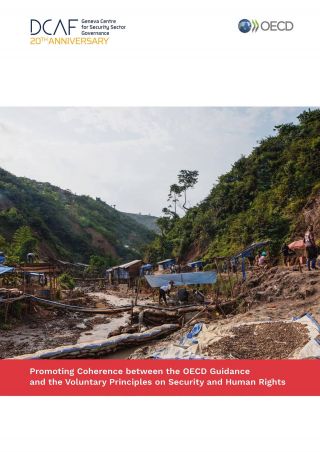
Promoting Coherence between the OECD Guidance and the Voluntary Principles on Security and Human Rights (DCAF, 2020)
Promoting Coherence between the OECD Guidance and the Voluntary Principles on Security and Human Rights (DCAF, 2020)

Seven Indicators of Corporate Best Practice in International Humanitarian Law (Australian Red Cross and RMIT University)
Seven Indicators of Corporate Best Practice in International Humanitarian Law (Australian Red Cross and RMIT University)

Learn about International Humanitarian Law (IHL): Free online training for businesses (Australian Red Cross)
Learn about International Humanitarian Law (IHL): Free online training for businesses (Australian Red Cross)

A Guide for Business: How to Develop a Human Rights Policy_Second edition (the UN Global Compact UNGC and OHCHR, 2015)
A Guide for Business: How to Develop a Human Rights Policy_Second edition (the UN Global Compact UNGC and OHCHR, 2015)

Voluntary Principles on Security and Human Rights Implementation Guidance Tools (ICMM, ICRC, IFC and IPIECA, 2011)
Voluntary Principles on Security and Human Rights Implementation Guidance Tools (ICMM, ICRC, IFC and IPIECA, 2011)

Auditing Implementation of Voluntary Principles on Security and Human Rights (Global Compact Network Canada, 2015)
Auditing Implementation of Voluntary Principles on Security and Human Rights (Global Compact Network Canada, 2015)

Measuring Quality of Relationships: Using ICMMs‚ Understanding Company-Community Relations‚ Toolkit (Shift, 2021)
Measuring Quality of Relationships: Using ICMMs‚ Understanding Company-Community Relations‚ Toolkit (Shift, 2021)

The Voluntary Principles on Security and Human Rights: An Implementation Toolkit for Major Project Sites (World Bank Group Multilateral Investment Guarantee Agency and Anvil Mining, 2008)
The Voluntary Principles on Security and Human Rights: An Implementation Toolkit for Major Project Sites (World Bank Group Multilateral Investment Guarantee Agency and Anvil Mining, 2008)

Voluntary Principles on Security and Human Rights: Performance Indicators (International Alert, 2008)
Voluntary Principles on Security and Human Rights: Performance Indicators (International Alert, 2008)

Voluntary Principles on Security & Human Rights National-Level Implementation Guidance Note (FFP & International Alert, 2010)
Voluntary Principles on Security & Human Rights National-Level Implementation Guidance Note (FFP & International Alert, 2010)

Voluntary Principles on Security and Human Rights Implementation Guideline - An extended summary (BP, 2008)
Voluntary Principles on Security and Human Rights Implementation Guideline - An extended summary (BP, 2008)

Policy Brief Guidance: Gender and Private Security Regulation (DCAF, OSCE/ODIHR and UN Women)
Policy Brief Guidance: Gender and Private Security Regulation (DCAF, OSCE/ODIHR and UN Women)

Human rights due diligence in conflict-affected settings: Guidance for extractives industries (International Alert, 2018)
Human rights due diligence in conflict-affected settings: Guidance for extractives industries (International Alert, 2018)

A Seat at the Table: Capacities and Limitations of Private Sector Peacebuilding (CDA Collaborative, Africa Center for Dispute Settlement, PRIO, 2018)
A Seat at the Table: Capacities and Limitations of Private Sector Peacebuilding (CDA Collaborative, Africa Center for Dispute Settlement, PRIO, 2018)

Training Tool: Doing Business in Conflict-affected Countries (UN Global Compact and Maplecroft, 2013)
Training Tool: Doing Business in Conflict-affected Countries (UN Global Compact and Maplecroft, 2013)

Human Rights Due Diligence in High Risk Circumstances: Practical Strategies for Businesses (Shift, 2015)
Human Rights Due Diligence in High Risk Circumstances: Practical Strategies for Businesses (Shift, 2015)

Making Women Workers Count A Framework for Conducting Gender-Responsive Due Diligence in Supply Chains (BSR and laudes foundation 2019)
Making Women Workers Count A Framework for Conducting Gender-Responsive Due Diligence in Supply Chains (BSR and laudes foundation 2019)

From Red to Green Flags - The Corporate Responsibility to Respect Human Rights in High-risk Countries (Institute for Human Rights and Business, 2011)
From Red to Green Flags - The Corporate Responsibility to Respect Human Rights in High-risk Countries (Institute for Human Rights and Business, 2011)

Guidance on Responsible Business in Conflict-Affected and Hight-Risk Areas: A Resource for Companies and Investors (UN Global Compact and Principles for Responsible Investment Initiative, 2010)
Guidance on Responsible Business in Conflict-Affected and Hight-Risk Areas: A Resource for Companies and Investors (UN Global Compact and Principles for Responsible Investment Initiative, 2010)

Reporting Business and Human Rights: A Handbook for Journalists, Communicators and Campaigners
Reporting Business and Human Rights: A Handbook for Journalists, Communicators and Campaigners

Conflict-Sensitive Business Practice: Guidance for Extractive Industries (International Alert, 2005)
Conflict-Sensitive Business Practice: Guidance for Extractive Industries (International Alert, 2005)

Baseline Study of Artisanal and Small-Scale Cobalt Mining in the Democratic Republic of the Congo
Baseline Study of Artisanal and Small-Scale Cobalt Mining in the Democratic Republic of the Congo

Enabling Economies of Peace - Public Policy for Conflict-Sensitive Business (Commissioned by the UN Global Compact, 2005)
Enabling Economies of Peace - Public Policy for Conflict-Sensitive Business (Commissioned by the UN Global Compact, 2005)

Mining the Disclosures 2019 - An Investor Guide to Conflict Minerals and Cobalt Reporting in Year Six
Mining the Disclosures 2019 - An Investor Guide to Conflict Minerals and Cobalt Reporting in Year Six

What's Needed: An Overview of Multi-Stakeholder and Industry Activities to Achieve Conflict-Free Minerals
What's Needed: An Overview of Multi-Stakeholder and Industry Activities to Achieve Conflict-Free Minerals

War, Law and Business: A free immersive e-learning module on international humanitarian law
War, Law and Business: A free immersive e-learning module on international humanitarian law

Oil and Gas Sector Guide on Implementing the UN Guiding Principles on Business and Human Rights (Shift and IHRB, 2013)
Oil and Gas Sector Guide on Implementing the UN Guiding Principles on Business and Human Rights (Shift and IHRB, 2013)

Human Rights Due Diligence Process: A Practical Guide to Implementation for Oil and Gas Companies (IPIECA, 2012)
Human Rights Due Diligence Process: A Practical Guide to Implementation for Oil and Gas Companies (IPIECA, 2012)

Oil and Gas Industry Guidance on Voluntary Sustainability Reporting (IPIECA, API and OGP, 2015)
Oil and Gas Industry Guidance on Voluntary Sustainability Reporting (IPIECA, API and OGP, 2015)

International Standards for Responsible Business in Conflict-Affected and Fragile Environments: An Overview
International Standards for Responsible Business in Conflict-Affected and Fragile Environments: An Overview

Protect, Respect and Remedy: a Framework for Business and Human Rights (Report for the UN Human Rights Council, 2008)
Protect, Respect and Remedy: a Framework for Business and Human Rights (Report for the UN Human Rights Council, 2008)

Guiding Principles on Business and Human Rights: Implementing the United Nations "Protect, Respect and Remedy" Framework (United Nations Human Rights, 2011)
Guiding Principles on Business and Human Rights: Implementing the United Nations "Protect, Respect and Remedy" Framework (United Nations Human Rights, 2011)

Factsheet: How is responsible security management integral to human rights due diligence?
Factsheet: How is responsible security management integral to human rights due diligence?

The Corporate Responsibility to Respect Human Rights: An Interpretive Guide (United Nations Human Rights, 2012)
The Corporate Responsibility to Respect Human Rights: An Interpretive Guide (United Nations Human Rights, 2012)

Shared Space Under Pressure: Business Support for Civic Freedoms and Human Rights Defenders (BHRRC & ISHR, 2018)
Shared Space Under Pressure: Business Support for Civic Freedoms and Human Rights Defenders (BHRRC & ISHR, 2018)

Factsheet: How should companies manage security and human rights challenges related to artisanal and small-scale mining?
Factsheet: How should companies manage security and human rights challenges related to artisanal and small-scale mining?

Gender-responsive Due Diligence for Business Actors: Human Rights-Based Approaches (Geneva Academy, 2018)
Gender-responsive Due Diligence for Business Actors: Human Rights-Based Approaches (Geneva Academy, 2018)

How can companies respect the rights of indigenous peoples when addressing security and human rights challenges?
How can companies respect the rights of indigenous peoples when addressing security and human rights challenges?

Doing Business with Respect for Human Rights: A Guidance Tool for Companies (Shift, Oxfam and Global Compact Network Netherlands, 2016)
Doing Business with Respect for Human Rights: A Guidance Tool for Companies (Shift, Oxfam and Global Compact Network Netherlands, 2016)

Factsheet: How can companies respect the rights of human rights defenders when addressing security-related challenges?
Factsheet: How can companies respect the rights of human rights defenders when addressing security-related challenges?

Case Study: How can companies use training and incentives to encourage public security forces to respect human rights?
Case Study: How can companies use training and incentives to encourage public security forces to respect human rights?

What makes stakeholder engagement meaningful? 5 insights from practice (UN Global Compact Network Germany)
What makes stakeholder engagement meaningful? 5 insights from practice (UN Global Compact Network Germany)

International Finance Corporation's (IFC) Policy on Environmental and Social Sustainability (2012)
International Finance Corporation's (IFC) Policy on Environmental and Social Sustainability (2012)

Heightened Human Rights Due Diligence for Business in Conflict-Affected Contexts: A Guide (UNDP and UN Working Group on Business and Human Rights, June 2022)
Heightened Human Rights Due Diligence for Business in Conflict-Affected Contexts: A Guide (UNDP and UN Working Group on Business and Human Rights, June 2022)

Addressing Security and Human Rights Challenges in Complex Environments Toolkit - Updated Edition (DCAF, ICRC and GCBHR, 2022)
Addressing Security and Human Rights Challenges in Complex Environments Toolkit - Updated Edition (DCAF, ICRC and GCBHR, 2022)

Human Rights Translated 2.0: A Business Reference Guide (Monash University, OHCHR, UNGC, 2017)
Human Rights Translated 2.0: A Business Reference Guide (Monash University, OHCHR, UNGC, 2017)

DCAF SSR Paper 13 - Business and Security Sector Reform: The Case for Corporate Security Responsibility (Mendes, 2015)
DCAF SSR Paper 13 - Business and Security Sector Reform: The Case for Corporate Security Responsibility (Mendes, 2015)

Practical actions for companies to identify and address the worst forms of child labour in mineral supply chains (OECD, 2017)
Practical actions for companies to identify and address the worst forms of child labour in mineral supply chains (OECD, 2017)

Human Rights in the Mining and Metals Industry - Overview, Managment Approach and Issues (ICMM, 2009)
Human Rights in the Mining and Metals Industry - Overview, Managment Approach and Issues (ICMM, 2009)

Start Here: Sustainability for Exploration, Development and Small Producing Mining Companies (NBS, 2014)
Start Here: Sustainability for Exploration, Development and Small Producing Mining Companies (NBS, 2014)

Women, Communities and Mining: The Gender Impacts of Mining and the Role of Gender Impact Assessment (Oxfam Australia, 2009)
Women, Communities and Mining: The Gender Impacts of Mining and the Role of Gender Impact Assessment (Oxfam Australia, 2009)

Due Diligence Guidance for Meaningful Stakeholder Engagement in the Extractive Sector (OECD, 2017)
Due Diligence Guidance for Meaningful Stakeholder Engagement in the Extractive Sector (OECD, 2017)

A Strategic Approach to Early Stakeholder Engagement - Good Practice Handbook for Junior Companies in the Extractive Industries (IFC, 2013)
A Strategic Approach to Early Stakeholder Engagement - Good Practice Handbook for Junior Companies in the Extractive Industries (IFC, 2013)

Stakeholder Engagement: A Good Practice Handbook for Companies Doing Business in Emerging Markets (IFC, 2007)
Stakeholder Engagement: A Good Practice Handbook for Companies Doing Business in Emerging Markets (IFC, 2007)

Human Rights and State-Investor Contracts: Guidance and Assessment Tool for Company Negotiators (DIHR, 2014)
Human Rights and State-Investor Contracts: Guidance and Assessment Tool for Company Negotiators (DIHR, 2014)

How Business Can Encourage Governments to Fulfil their Human Rights Obligations (United Nations Global Compact, 2010)
How Business Can Encourage Governments to Fulfil their Human Rights Obligations (United Nations Global Compact, 2010)
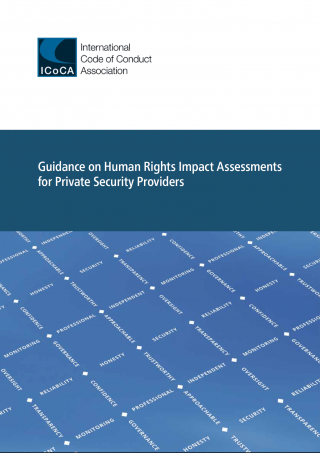
The purpose of this guidance document is to help private security companies conduct human rights due diligence (HRDD).
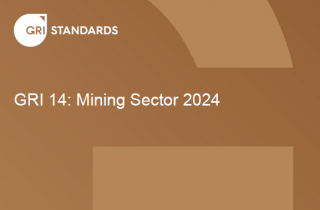
Global Reporting Initiative: DCAF-ICRC recommendations strengthen reporting standards on mining
The recently released GRI 14: Mining Sector 2024 addresses the growing disclosure and due diligence obligations expected of mining companies.

Engaging with the UN Global Compact since 2012, DCAF is thrilled to be a member of the formal network that supports, promotes, and implements the Compact’s Ten Principles.

How can oil and gas companies with operations in complex environments or conflict-affected regions tackle responsible security and human rights risk management, all while addressing the growing global demands of the energy transition?

Strengthening conflict-sensitivity and responsible security management in standards on business and human rights: DCAF-ICRC Partnership contributes to the Global Reporting Initiative’s public consultation
In February 2023, DCAF and ICRC respectively submitted two contributions to the Global Reporting Initiative’s (GRI) public consultation on its Global Sustainability Standards Board (GSSB) Workplan 2023-2025.

DCAF – Geneva Centre for Security Sector Governance
Business and Security Division
www.businessandsecurity.dcaf.ch
Chemin Eugène-Rigot 2E,
CH-1202 Geneva Switzerland
Tel: +41 (0) 22 730 94 18
Contact us

International Committee of the Red Cross (ICRC)
www.icrc.org
Avenue de la Paix 19, 1202 Geneva, Switzerland
Economic Adviser
Department of International Law and Policy
Tel: +41 (0) 22 734 6001
Contact us
















































